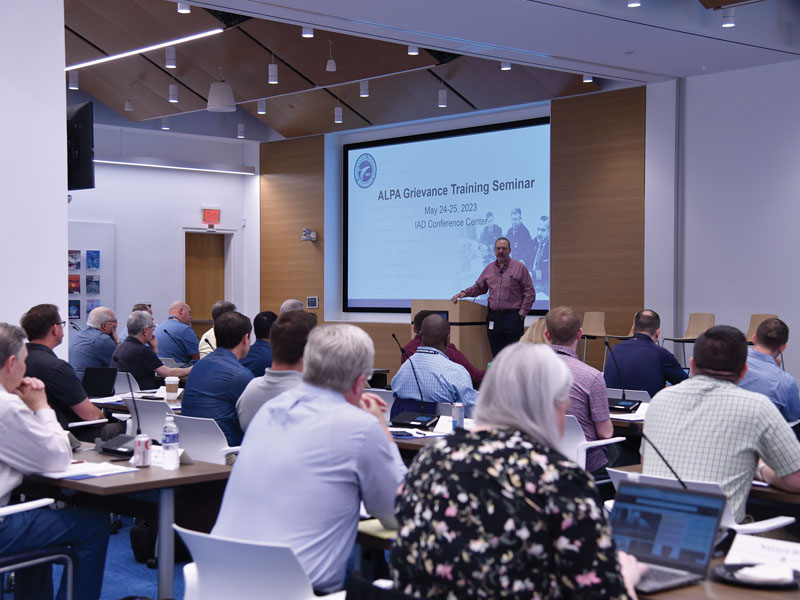ALPA Training Seminar Showcases Effective Grievance Practices
By John Perkinson, Senior Staff Writer

Andrew Shostack, director of ALPA’s Representation Department, reviews the basics of contract enforcement during the Grievance Training Seminar.
ALPA pilot groups have made tremendous strides in negotiating substantial contract gains in recent years, but these accomplishments are meaningless if managements don’t comply with the terms they’ve agreed to. Pilot Grievance Committees play a critical role in ensuring that airline managements adhere to the contracts they’ve negotiated, so each year ALPA convenes its Grievance Training Seminar to review and discuss various relevant topics.
Held March 19–21 at the Association’s McLean, Va., offices, this year’s event brought together 36 volunteers from 21 ALPA pilot groups along with staff from the union’s Representation and Legal Departments as well as veteran pilot subject-matter experts to discuss the state of contract enforcement and peer support in pilot disciplinary matters. Special attention was given to best practices and the value of incorporating dispute-resolution activities in pilot group strategic-planning efforts.
Capt. Wes Clapper, ALPA’s vice president–finance/treasurer, welcomed participants during the seminar’s opening session and encouraged them to network with fellow attendees. “Get to know them. Exchange your contact information. There’s a lot you can learn.”
“We all basically do the same thing, but we do it in a wide variety of ways,” said Capt. David Kidder (JetBlue), the newly appointed President’s Grievance Committee chair, speaking about the dispute-resolution process at various ALPA pilot groups. He noted that part of his committee’s charge is to review these different practices and determine how the Association can improve its overall performance.
Much of the seminar agenda featured presentations from staff and subject-matter experts, including a review of the primary components of the grievance process. Andrew Shostack, director of ALPA’s Representation Department, who led the discussion, observed that the Grievance Committee is sometimes referred to as the Contract Renegotiating Committee because “you may have an opportunity to fix things that are broken.” Another presentation examined pertinent provisions of the Railway Labor Act and the Canada Labour Code.
Participants explored considerations for pursuing arbitration to resolve more complex, outstanding disputes, and how elected pilot leaders representing members involved in disciplinary actions often turn to grievance volunteers for assistance. In these cases, John Hanson, ALPA’s senior labor relations counsel, stressed the need to conduct thorough research, asserting, “There’s no substitute for preparation.”
The group looked at incident-reporting networks, including ALPA’s DART program, and methods for ensuring proper document retention. In addition, a panel discussed the role of grievance processing as part of a master executive council’s strategic plan and how important it is to coordinate activities with those of other committees. Capt. Dana Dann-Messier (Delta), who leads ALPA’s Strategic Planning Committee, pointed out that “allowing committees to operate independently and without proper coordination can sometimes lead them to work against one another.”
The seminar also featured several hands-on activities, including a grievance-drafting exercise in which pilots reviewed four contract violations. They assessed the facts to determine what kind of research and preparation would be required and the potential remedies for each case.
In another exercise, pilots received reports of a potential scope violation at their carriers. One at a time and based on the facts of the case, they presented their positions in simulated first-step hearings.
During a third interactive session, pilots were tasked with sorting through a backlog of 29 grievances to determine which were well suited for arbitration, which should be addressed through negotiations, and which could be deferred for other possible means of resolution. Attendees discussed the need to be strategic in how a Grievance Committee processes its work to best position the pilot group for success in contract enforcement or to make mid-contract gains.
For each of the three exercises, pilots engaged in after-action debriefings to compare results and identify optimal strategies.
During the seminar’s conclusion, Jeff Loesel, a manager in ALPA’s Representation Department, who moderated this year’s event, thanked the pilot volunteers for their dedication and commitment. “I encourage you to seize your role within your Grievance Committee to help meet the objectives of your pilot group,” he remarked. “Use your staff resources, contact the President’s Grievance Committee, and reach out to other pilot groups to uphold the provisions your pilot group worked so hard to negotiate and is now contractually entitled to.”

